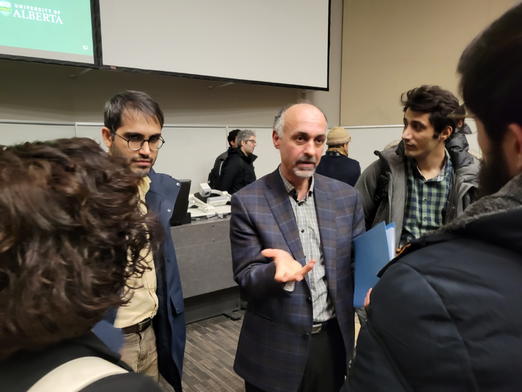Arab Spring’s rebellions upended most stereotypes about Middle East, say prominent scholars
Helen Metella - 9 February 2023

Mahdavi chats with attendees after the event.
A widely held view that the Middle East and Muslim world is inherently anti-democratic is an outdated cliché, said leading scholars from within and outside the University of Alberta during an interdisciplinary event hosted by the Faculty of Arts for International Week.
In fact, the multiple uprisings of 2011’s Arab Spring were not a failure but are an “unfinished project,” said Asef Bayat, a professor of sociology, global and transnational studies from the University of Illinois, Urbana-Champaign. Attending virtually, Bayat delivered a keynote address on February 7 that kicked off a panel discussion titled Resistance, Social Movements Democracy: Myth of Middle East Exceptionalism.
Bayat said that, if they are viewed from a global perspective, the regions known collectively as MENA — the Middle East and North Africa — are not stagnant, isolated, homogenous or tribalistic, despite frequently being portrayed that way by the media and foreign policies.
He pointed out that the interests of these regions have influenced religion, foods and culture internationally; their knowledge and science have been exchanged and linked with the West; and immigration within the regions has generated cosmopolitan life there.
The lively interdisciplinary discussion that followed his lecture to more than 100 people at the Telus Centre featured U of A professors Mojtaba Mahdavi, Yasmeen Abu-Laban and Michael Frishkopf, from the departments of political science and music, respectively.
Disproving stale theory
Mahdavi, a professor of political science and the ECMC Chair in Islamic Studies, is the editor of the book, The Myth of Middle East Exceptionalism: Unfinished Social Movements, which was officially launched at the event. Abu-Laban and Frishkopf are among the more than 20 international scholars who contributed chapters that debunk the notion that the Middle East resists democracy because of the region’s violent culture.
Political science professor Abu-Laban, whose co-written chapter examines the politicization of race in Israel-Palestine relations, said that politics of race has been central to the Middle East. As a result, she said, the colonial history and apartheid conditions of Israel demand attention.
“The Arab Spring was a challenge to prevalent assumptions about the Middle East, and the movements that started then prevail today,” she says.
As director of the Canadian Centre for Ethnomusicology, Frishkopf helped collect and record stirring chants and songs that sprang up in 2011 at the Arab Spring’s anti-government protests, which began in Tunisia and spread to Libya, Egypt, Yemen, Syria and Bahrain. He said these spontaneous cultural works counter the stereotypical view of Middle East exceptionalism and demonstrate the vigor of what ordinary people can achieve.
More waves expected
Mahdavi argued that although the MENA’s first wave of contemporary social movements (from 2009 to 2013) was not quite successful politically, the region is currently experiencing the second wave, which began in 2017, and most likely will witness the third and more democratic waves in the future.
“More than a decade after the birth of contemporary social movements in the MENA, scholars are asking what these movements have achieved and how we should evaluate their lasting legacies,” he says. “The quiet encroachments of counterrevolutionary forces in the post-Arab Spring era have contributed to the revival of an outdated Orientalist discourse of Middle East exceptionalism, implying that the region’s culture is exceptionally immune to democratic movements, values and institutions.
He continues:
“This book and this event challenge different manifestations of the idea of cultural exceptionalism in the Middle East and Muslim contexts — each with a specific approach and country case studies, or themes on women’s and student’s movement, among others.”
Until March 15, Mahdavi’s book is available at a discounted price by using the code 05MMEE23 online at press.syr.edu.
The lecture and panel were part of the U of A’s annual International Week, which runs through February 10. The week’s intent is to help the campus community engage and connect with UN Sustainable Development goals to address the world’s most pressing issues.